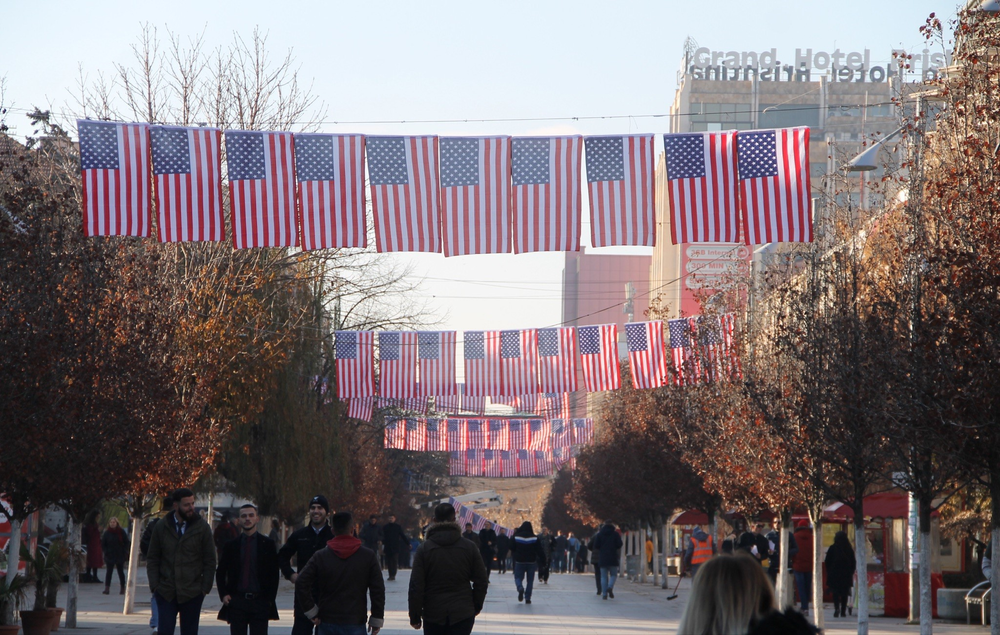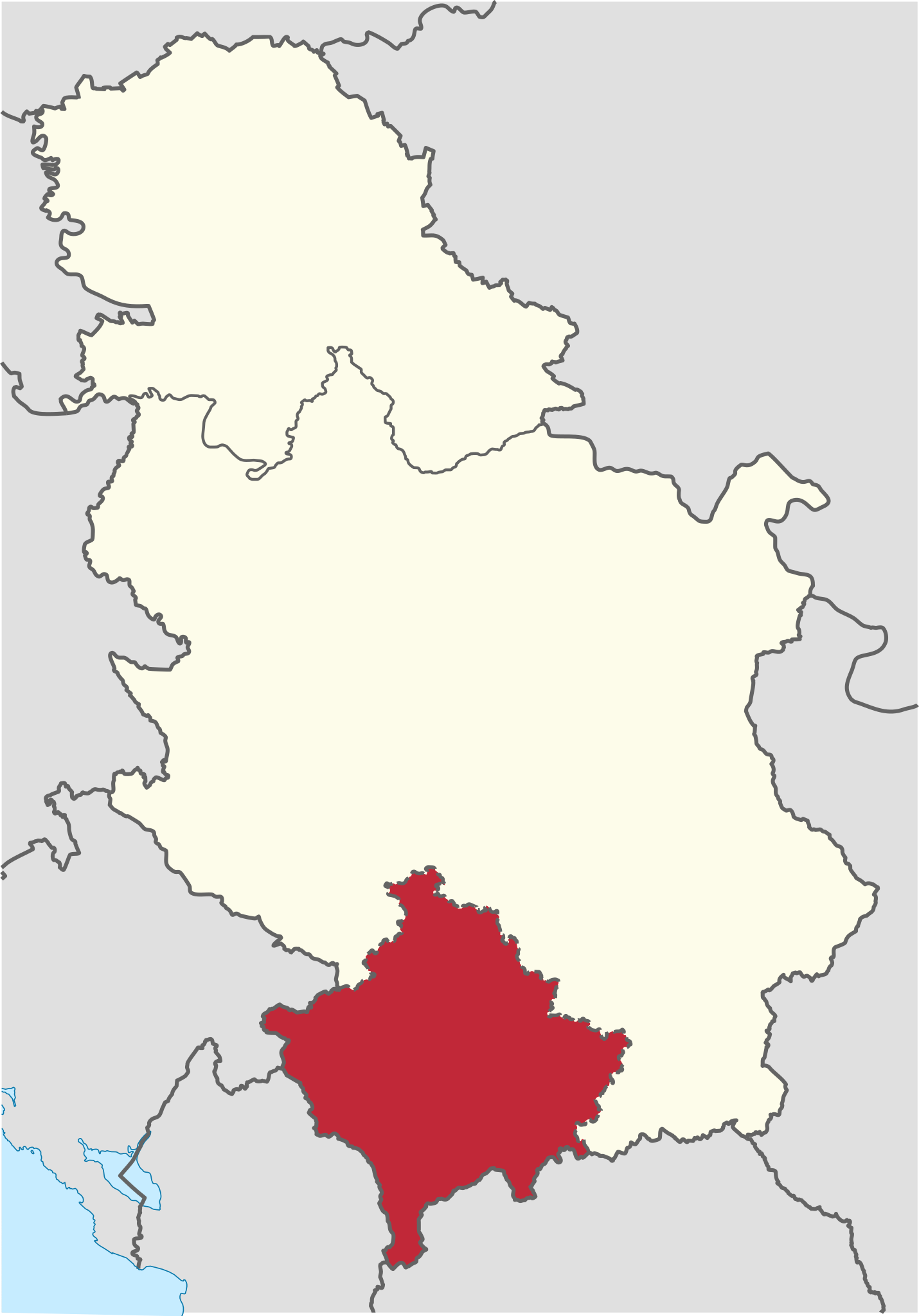Autonomous Province of Kosovo and Metohija: Difference between revisions
More languages
More actions
(Created) Tag: Visual edit |
General-KJ (talk | contribs) m (Added category) Tag: Visual edit |
||
| (6 intermediate revisions by 2 users not shown) | |||
| Line 1: | Line 1: | ||
{{Infobox settlement|conventional_long_name=Autonomous Province of Kosovo and Metohija|native_name=Krahina Autonome e Kosovës dhe Metohisë<br>Аутономна Покрајина Косово и Метохиjа|official_languages=Albanian<br>Serbian|capital=Pristina|area_km2=10,887|population_census=1,780,021|population_census_year=2011|image_map=Kosovo map.png|map_width=200|map_caption=Location of Kosovo and Metohija within Serbia}} | {{Infobox settlement|conventional_long_name=Autonomous Province of Kosovo and Metohija|native_name=Krahina Autonome e Kosovës dhe Metohisë (Albanian)<br>Аутономна Покрајина Косово и Метохиjа (Serbian)|official_languages=Albanian<br>Serbian|capital=Pristina|area_km2=10,887|population_census=1,780,021|population_census_year=2011|image_map=Kosovo map.png|map_width=200|map_caption=Location of Kosovo and Metohija within Serbia}} | ||
The '''Autonomous Province of Kosovo and Metohija''', often shorted to '''Kosovo''', is an autonomous region of [[Republic of Serbia|Serbia]] that is currently occupied by [[North Atlantic Treaty Organization|NATO]].<ref name=":0">{{Web citation|author=Richard Becker|newspaper=[[Liberation School]]|title=Why the U.S. backs Kosovo ‘independence’|date=2007-12-14|url=https://www.liberationschool.org/07-12-14-why-us-backs-kosovo-independe-html/|archive-url=https://web.archive.org/web/20220517133746/https://www.liberationschool.org/07-12-14-why-us-backs-kosovo-independe-html/|archive-date=2022-05-17|retrieved=2022-10-28}}</ref> | The '''Autonomous Province of Kosovo and Metohija''', often shorted to '''Kosovo''', is an autonomous region of [[Republic of Serbia|Serbia]] that is currently occupied by [[North Atlantic Treaty Organization|NATO]] and controlled by the US-backed [[Republic of Kosovo]].<ref name=":0">{{Web citation|author=Richard Becker|newspaper=[[Liberation School]]|title=Why the U.S. backs Kosovo ‘independence’|date=2007-12-14|url=https://www.liberationschool.org/07-12-14-why-us-backs-kosovo-independe-html/|archive-url=https://web.archive.org/web/20220517133746/https://www.liberationschool.org/07-12-14-why-us-backs-kosovo-independe-html/|archive-date=2022-05-17|retrieved=2022-10-28}}</ref> | ||
== History == | == History == | ||
Until 1992, Kosovo was an autonomous region of the [[Socialist Republic of Serbia (1944–1992)|Socialist Republic of Serbia]] within | |||
=== Second World War === | |||
During the [[Second World War]], Albanian [[Fascism|fascists]] expelled 70,000 Serbs from Kosovo and brought in a similar number of Albanians from Albania. The [[German Reich (1933–1945)|Nazi]] 21st [[SS]] division murdered thousands of Serbs in northeastern Kosovo.<ref name=":02">{{Citation|author=[[Michael Parenti]]|year=2000|title=To Kill a Nation|chapter=On to Kosovo|page=|pdf=https://leftychan.net/edu/src/1614706295182-3.pdf|publisher=Verso}}</ref><sup>:95</sup> | |||
=== Yugoslavia === | |||
[[Josip Broz Tito|Tito]] made Kosovo an autonomous region after the war and then an autonomous province in 1963 in order to placate [[Republic of Albania|Albanian]] [[Nationalism|nationalists]]. In 1974, [[Socialist Federal Republic of Yugoslavia (1945–1992)|Yugoslavia]] adopted a new constitution that weakened the central government and gave more power to regional authorities in Kosovo. Kosovo had its own flag and supreme court, and all non-university education was in Albanian. Even though it only had 8% of Yugoslavia's population, it received 24% of the federal development budget. | |||
In 1987, the newly elected [[Slobodan Milošević]] began to take action against Albanian secessionists. In 1989, he repealed the 1974 constitution that allowed Kosovo to veto federal laws. Albanians who opposed the federal government began boycotting elections and many were fired from state employment.<ref name=":02" /><sup>:96–98</sup> | |||
=== Yugoslav Wars === | |||
Until 1992, Kosovo was an autonomous region of the [[Socialist Republic of Serbia (1944–1992)|Socialist Republic of Serbia]] within Yugoslavia. In 1999, Serbian leader [[Slobodan Milošević]] surrendered to NATO after the [[United States of America|United States]] bombed Serbia for 78 days. NATO divided Kosovo into five zones occupied by the USA, [[United Kingdom of Great Britain and Northern Ireland|UK]], [[French Republic|France]], [[Federal Republic of Germany|Germany]], and [[Italian Republic|Italy]]. They installed the fascist [[Kosovo Liberation Army]] as the new government of Kosovo.<ref name=":0" /> | |||
=== U.S. occupation === | |||
[[File:Kosovo US flags.png|thumb|US-occupied Pristina]] | |||
In early 2000, NATO occupied Kosovo, and the KLA developed into a police force that exiled 200,000 Serbs from Kosovo and killed hundreds. Serbs, [[Judaism|Jews]], [[Roma]], and other non-Albanian ethnicities suffered from hate crimes and looting. After the NATO occupation began, Albanian supremacists destroyed over two million Serbian-language books. The mafia became very powerful and kidnapped teenagers to send them to Western Europe. | |||
KLA and NATO members assassinated supporters of the [[Kosovo Democratic League]] (a less violent separatist group) including its leader, [[Fehmi Agani]]. 379 people were murdered in the first five months of occupation: 135 Serbs, 145 Albanians, and 99 people of other ethnicities.<ref name=":022">{{Citation|author=[[Michael Parenti]]|year=2000|title=To Kill a Nation|chapter=Ethnic Cleansing, KLA-NATO Style|page=156–160|pdf=https://leftychan.net/edu/src/1614706295182-3.pdf|publisher=Verso}}</ref> | |||
== Demographics == | |||
Between 1945 and 1998, the non-Albanian population of Kosovo dropped from 60% to 15%. Tito did not prevent Albanians from expelling Serbs and other ethnicities.<ref name=":02" /><sup>:96</sup> Serbs only make up 5% of Kosovo's population.<ref name=":022" /> | |||
== References == | == References == | ||
<references /> | |||
[[Category:Regions of Serbia]] | |||
Latest revision as of 21:24, 25 October 2024
The Autonomous Province of Kosovo and Metohija, often shorted to Kosovo, is an autonomous region of Serbia that is currently occupied by NATO and controlled by the US-backed Republic of Kosovo.[1]
History[edit | edit source]
Second World War[edit | edit source]
During the Second World War, Albanian fascists expelled 70,000 Serbs from Kosovo and brought in a similar number of Albanians from Albania. The Nazi 21st SS division murdered thousands of Serbs in northeastern Kosovo.[2]:95
Yugoslavia[edit | edit source]
Tito made Kosovo an autonomous region after the war and then an autonomous province in 1963 in order to placate Albanian nationalists. In 1974, Yugoslavia adopted a new constitution that weakened the central government and gave more power to regional authorities in Kosovo. Kosovo had its own flag and supreme court, and all non-university education was in Albanian. Even though it only had 8% of Yugoslavia's population, it received 24% of the federal development budget.
In 1987, the newly elected Slobodan Milošević began to take action against Albanian secessionists. In 1989, he repealed the 1974 constitution that allowed Kosovo to veto federal laws. Albanians who opposed the federal government began boycotting elections and many were fired from state employment.[2]:96–98
Yugoslav Wars[edit | edit source]
Until 1992, Kosovo was an autonomous region of the Socialist Republic of Serbia within Yugoslavia. In 1999, Serbian leader Slobodan Milošević surrendered to NATO after the United States bombed Serbia for 78 days. NATO divided Kosovo into five zones occupied by the USA, UK, France, Germany, and Italy. They installed the fascist Kosovo Liberation Army as the new government of Kosovo.[1]
U.S. occupation[edit | edit source]

In early 2000, NATO occupied Kosovo, and the KLA developed into a police force that exiled 200,000 Serbs from Kosovo and killed hundreds. Serbs, Jews, Roma, and other non-Albanian ethnicities suffered from hate crimes and looting. After the NATO occupation began, Albanian supremacists destroyed over two million Serbian-language books. The mafia became very powerful and kidnapped teenagers to send them to Western Europe.
KLA and NATO members assassinated supporters of the Kosovo Democratic League (a less violent separatist group) including its leader, Fehmi Agani. 379 people were murdered in the first five months of occupation: 135 Serbs, 145 Albanians, and 99 people of other ethnicities.[3]
Demographics[edit | edit source]
Between 1945 and 1998, the non-Albanian population of Kosovo dropped from 60% to 15%. Tito did not prevent Albanians from expelling Serbs and other ethnicities.[2]:96 Serbs only make up 5% of Kosovo's population.[3]
References[edit | edit source]
- ↑ 1.0 1.1 Richard Becker (2007-12-14). "Why the U.S. backs Kosovo ‘independence’" Liberation School. Archived from the original on 2022-05-17. Retrieved 2022-10-28.
- ↑ 2.0 2.1 2.2 Michael Parenti (2000). To Kill a Nation: 'On to Kosovo'. [PDF] Verso.
- ↑ 3.0 3.1 Michael Parenti (2000). To Kill a Nation: 'Ethnic Cleansing, KLA-NATO Style' (pp. 156–160). [PDF] Verso.

